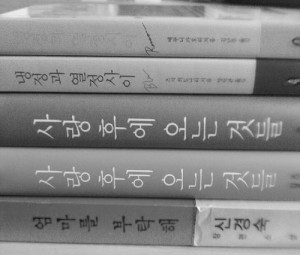 Today, I got a mail from a reader of my blog TOPIK GUIDE asking whether he should study all the grammar patterns and vocabulary of Korean language before he starts reading authentic text, like Korean novels. The short answer to that question is NO.
Today, I got a mail from a reader of my blog TOPIK GUIDE asking whether he should study all the grammar patterns and vocabulary of Korean language before he starts reading authentic text, like Korean novels. The short answer to that question is NO.
Most of the foreign language learners make this mistake. They think they would start speaking the language once they master ‘everything.’ They think they will watch movies in that language, read novels and non-fiction books, write poems and do all the other fascinating things once they have ‘learned’ the language. Problem is that you will NEVER feel like you have completely ‘learned’ the language. And finally you will end up never doing things you always wanted to do.
We can become experts in a foreign language but we always remain a language learner. There will always be things that you will not know or understand. There will always be grammar patterns that you will find confusing or will have no idea about. And as far as vocabulary is concerned, just think for a second, do you know all the words in even your mother tongue? There must be hundreds of words in your first language which you will have to look up the dictionary for. But you still read, write and speak in you mother tongue without a problem, don’t you? When you come across an unknown word while reading an old classic or something, sometimes you don’t even look up the dictionary and just guess the meaning in the context. Then, what makes you think you need to know all the words and grammar rules of a foreign language to read novels and watch movies?
The best way to improve your foreign language skills is to expose yourself to a lot of authentic language material – real-time conversation, text, images, audio and video. It becomes more crucial when you are not living in the country where that language is spoken. In that situation exposing yourself to authentic material like stories, news, novels, music and movies. Because you don’t have the luxury to access real-time language usage and the text and conversations in your language textbooks are not ‘real’ language. That’s not the way people speak or write in that country. The text has been written to suit your level and is not authentic.
The best approach is to start doing, what you want to do, in that language RIGHT NOW. Refer to your grammar book and dictionary as you come across something you don’t know. Try to guess, ask your teacher or friends, Google. But don’t get your focus distracted too much from the ‘content’ to the technicalities of the language.
Starting with grammar and vocabulary first and then going up to the content (bottom-up) is the most common and flawed language learning method used all over the world. A lot of research have been done in the field of language education to show that ‘top-down’ approach, which is to focus on the meaning of the content as a whole and go to the components of grammar and vocabulary only when required, works better than ‘bottom-up’ one. Let your brain use previous linguistic knowledge and background information to process the language and predict the meaning based on overall context. We always do this top-down language processing, without even realizing, in real-life communication. But we are so accustomed to the good old grammar-based language learning method that even experienced language teachers are not very comfortable implementing the ‘top-down’ language learning approach in the classroom.
안녕하세요. 한국을 사랑하는 인도인 유튜브 채널을 보고 블로그를 찾게 되었어요. 여쭤보고 싶은게 있어요. [email protected]로 연락한번 주실수 있을까요? ^^